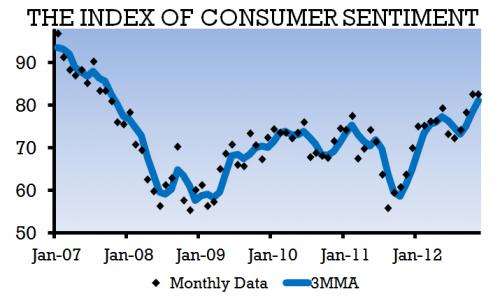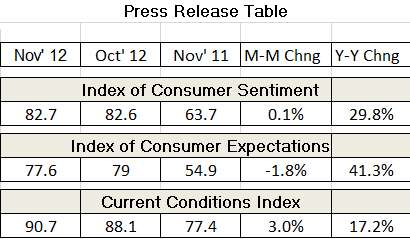Consumer confidence remains high in November, but will Congressional Grinch steal Christmas?

Consumer confidence remained largely unchanged from last month at its highest level in five years, according to University of Michigan economist Richard Curtin, director of the Thomson Reuters/University of Michigan Surveys of Consumers. The Surveys, conducted by the U-M Institute for Social Research (ISR), have been monitoring consumer attitudes and expectations for over 60 years.
But when asked to identify any recent economic news, consumers more frequently made unfavorable references to potential changes in future federal tax and spending programs as well as the inability of the political parties to reach a timely settlement. There have only been five other surveys during the past half century in which more consumers spontaneously mentioned their uncertainty about government policies, according to Curtin. Interestingly, the past occurrences were also related to taxes, spending, and the federal deficit: Clinton's deficit reduction program in 1993 and last summer's debt ceiling debate which prompted a drop in the Sentiment Index to 55.8, the fourth lowest level recorded in the long history of the surveys. While consumers remain optimistic, that optimism is contingent on the promise of no higher taxes, except on the wealthy.

"The gains in confidence ended in late November as consumers became more uncertain about when and how the fiscal cliff with be bridged," said Curtin. "While they had anticipated a last minute settlement, some consumers are beginning to doubt whether that will happen before higher tax rates take effect in January. While a resolution just before year-end could reverse any future spending declines, it would nonetheless diminish holiday spending. Moreover, consumers do not make a distinction between federal income and payroll taxes, so any settlement that excludes an extension of the payroll tax cut could reduce optimism starting in early January."
Personal Finances Improve
More households reported gains in their personal finances in the November survey than any other time since March of 2008. Although a slightly larger number reported worsening finances, this represents a large gain from a year ago when worsening finances were reported twice as frequently as an improving financial situation.
Employment Gains Expected
Anticipated gains in the economy meant that consumers held much more favorable job expectations. The survey recorded the most favorable outlook for the unemployment rate since 1984. Nearly one-in-three consumers expected a lower unemployment rate during the year ahead in both the October and November 2012 surveys.
Consumer Sentiment Index
The Sentiment Index was 82.7 in November 2012, just above 82.6 in October, and well above last November's 63.7. The Expectations Index and Current Conditions components moved in opposite directions. The Expectations Index slipped to 77.6 in November from 79.0 in October, while the Current Conditions Index rose to 90.7 in November from 88.1 in October. Both components were well above last November, with the Expectations Index posting more than twice the gain of the Current Conditions Index.
More information:
www.ns.umich.edu/Releases/2012 … hart-2012-11-21.xlsx
www.ns.umich.edu/Releases/2012 … Table-2012-11-21.xls
Provided by University of Michigan



















